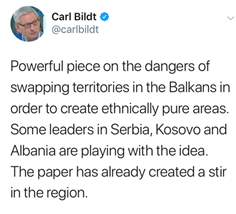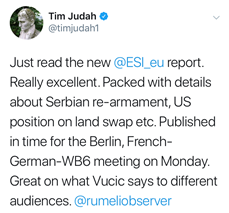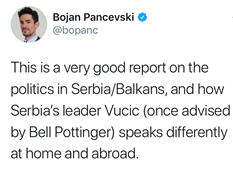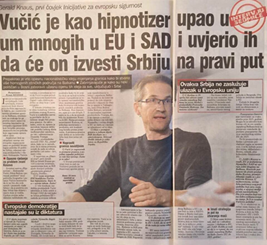The Hypnotist – North Macedonia this summer – In Memoriam Dejan
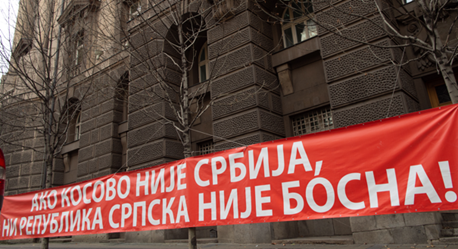
"If Kosovo is not Serbia then Republika Srpska is not Bosnia!"
(in front of the Serbian Foreign Ministry)
This newsletter is also available in French:
L'hypnotiseur – La Macédoine du Nord, cet été
Dear friends of ESI,
In August 2018 the presidents of Serbia and Kosovo spoke in the Austrian village of Alpbach about a possible agreement on "normalisation" involving new ethnic borders. Eight months later such an agreement looks further away than ever.
Instead: the US and the Kosovo government quarrelled publicly as they never have before. The Kosovo parliament passed a resolution against the Kosovo president's willingness to discuss changing borders. The EU is divided on Balkan policy. Germany and the US distrust each other. The EU High Representative is isolated among member states. In Serbia media are full of stories that arouse nationalist emotions, warning of an impending Albanian attack to drive out Serbs. And a majority of people supports president Aleksandar Vucic, who restores Serbian military power in order to confront an alleged Greater Albanian invasion. And Kosovo imposed a tariff of 100 percent on Serbian imports.
To anyone who expected a diplomatic breakthrough between Belgrade and Pristina, this balance sheet might look like a failure. But what if the objective was to change the parameters of Western policy, and create more room for Serbian nationalists to pursue traditional objectives?
Threats and demarcation
Our new report recommends that European leaders close Pandora's box of debates on ethnic borders as quickly and forcefully as possible. At the same time the EU should make clear that no country negotiating accession can threaten neighbours with military interventions or create hysteria about its ethnic minorities without consequences.
All of this is happening in Serbia today. On 6 February 2018 Serbia's minister of defense, Aleksandar Vulin, explained that his country's priority was "to stop 'Greater Albania' after a century of expansion." For this, Serbia needed "a permanent and firm demarcation between Serbs and Albanians on the territory of Kosovo." Four months later Vulin stated that if Albania and Kosovo were to unite in a Greater Albania, "Serbs could not remain divided, that would not be possible." In November 2018 Vulin explained that, in fact, Greater Albania was already emerging:
"Greater Albania is being created as an ethnically pure country. In order to achieve this Serbs have to move out, the entire Kosovo has to be carved out from Serbia, a part of Montenegro must be taken, as well as parts of Macedonia and Greece. Greater Albania is a threat for the entire region."
Serbian politicians also regularly link Greater Albania to the future of Bosnia and Herzegovina. Serbian Minister of Foreign Affairs Ivica Dacic argued recently that what matters are not states but ethnic groups: the way to solve problems is for "Serbs" (Belgrade) to talk to "Albanians" (Tirana). Meanwhile Milorad Dodik, the leading Bosnian Serb politician, recommends ethnic demarcation as the way forward for Bosnia and Herzegovina in February 2019:
"It would probably have been better if there had been no attempt to glue Bosnia back together, as it was done in Dayton [the peace agreement in 1995]. Maybe it would have been better to do a demarcation."
In April 2019 Dodik explained: "If we want a stabile Balkans then [the borders] have to be redrawn in a way to bring together areas with dominant nations."
Men of the 1990s and their three parties dominating Serbia in 2019
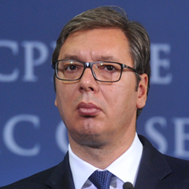
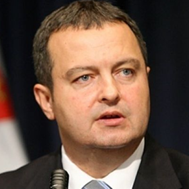
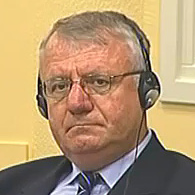
Aleksandar Vucic, Progressives – Ivica Dacic, Socialists – Vojislav Seselj, Radicals
Blitzkrieg?
On 16 August 2018 president Aleksandar Vucic offered a glimpse into his thinking on Kosovo, describing it as a powder-keg in which both sides were just waiting to attack at any moment:
"Everyone will wait for an opportunity to strike the other in order to achieve an advantage on the ground. And every day we will worry if they will attack us in the north, where they will strike us, with whose support …"
On 2 October 2018 Serbian foreign minister Ivica Dacic explained that without a deal on demarcation inside Kosovo there was always a risk of an "armed attack on North Kosovo," the threat of a "Blitzkrieg".
In February 2019 Dacic told Pink television: "Let us be clear about one thing, people: if there is an attack on Serbs in North Kosovo, we will have to defend them militarily, not with prayers. We must be aware of that."In March 2019 Dacic stated at a press conference: "In case KFOR does not guarantee security, which it is obliged to do according to UN resolution 1244, in case there is an armed attack on Serbs, Serbia will defend them." In March 2019 Milovan Drecun, chairperson of the Committee for Kosovo in the Serbian parliament, warned that the Greater Albanian invasion was imminent:
"We were sent a message that the Albanian military might help special forces in Pristina to finalise the ethnic cleansing of Kosovo, to expel all Serbs, at least those in North Kosovo. This is a dangerous message, that can take us and the entire region to war."
The messages conveyed by Serbian ministers and parliamentarians is clear: armed conflict is close, and if any provocation occurs, Serbia will send forces into North Kosovo.
At the same time Serbia is rearming. As president Vucic explained in November 2018: "We and the Hungarians are quite close (when it comes to military strength). All others are far, far behind … no other country in the former Yugoslavia is as strong as we are. And we will continue to strengthen our military dramatically."
According to the Stockholm International Peace Research Institute, Serbia spent 161 million dollars more on defense in 2017 than all other five Western Balkan states together. The official budgets of the Serbian ministry of defense show a sharp increase between 2013 and 2019.
Military expenditure in the Balkans, SIPRI (in USD, million)
|
Country |
2017 |
|
Serbia |
731 |
|
WB5 |
570 |
|
Bosnia |
165 |
|
Albania |
162 |
|
North Macedonia |
112 |
|
Montenegro |
74 |
|
Kosovo |
57 |
A naïve observer might respond to this with an obvious question: Why? Serbia is a candidate country negotiating to join the EU. It is surrounded by NATO members Slovenia, Croatia, Hungary, Romania, Bulgaria, Montenegro, Albania and soon North Macedonia. Who does its military seek to impress? An examination of recent statements by president Vucic and his ministers suggests answers. These are not reassuring. (More in: The Hypnotist)
Message from the Alps
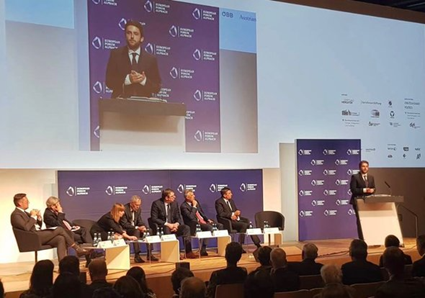
Alpbach: Adnan Cerimagic speaking to Aleksandar Vucic, Hashim Thaci
In Alpbach last summer, ESI's Adnan Cerimagic warned the presidents that the idea of changing borders based on ethnicity was extremely dangerous. It was an idea based on an argument often heard before the wars of the 1990s:
"[Balkan politicians] were all making a simple but destructive argument: You are only safe if your own ethnic group is in control. You are only safe when and where your own ethnic group is in control. This idea destroyed Yugoslavia and Doboj. It destroyed families. It led to mass expulsions and genocide in Srebrenica. It turned borders into frontlines and created new borders drawn in human blood.
But ideas can change. And they did in Bosnia. Doboj is a good example. Half of the pre-war non-Serb population returned to live there today: almost 20,000 of them. Mosques and minarets have been rebuilt. The Doboj of my nightmare is today an ordinary city, where Bosniaks and Croats do not fear their Serb mayor. They even vote for him repeatedly.
And this is why I am worried. Today's Doboj was possible because the international community had a clear policy: No more changes of borders along ethnic lines. Serbs should be safe in Central Bosnia, as much as Croats in Banja Luka. Bosniaks in Doboj or Srebrenica. Macedonians should be safe in Tetovo, as much as Bosniaks in Novi Pazar, Albanians in Presevo, or Serbs in Gracanica and Mitrovica.
Some ideas seem innocent at first, but as they grow up they can become monstrous. The idea that you are only safe if, when and where your own ethnic group is in control is such an idea."
The EU and Balkan peace – vision 2025
The EU must walk the region back from the brink of returning to the dark ideas of the 1990s. It needs a credible strategy for how Serbia, Kosovo and the Balkans can move forward towards integration with the rest of Europe. This is a matter of war and peace.
Already at the upcoming Western Balkans meeting on 29 April in Berlin both Germany and France should reaffirm core principles that led the EU to open accession talks with Serbia: "This process [normalisation between Serbia and Kosovo] shall ensure that both can continue on their respective European paths, while avoiding that either can block the other in these efforts and should gradually lead to the comprehensive normalization of relations."
At the same time the EU needs a credible roadmap for the region for the period 2020-2025:
- a concrete goal open to all Western Balkan countries: meet the required standards to become full members of the EU's common market by 2025 (with transition periods). This would sharply increase the attractiveness of the region for investors.
- countries making progress on the rule of law, minority rights and good neighborly relations to be gradually included in EU regional and cohesion policies.
- the EU to support the region moving towards a Western Balkans Schengen area by 2030. Balkan borders should truly become invisible by then.
- Germany, France and other EU members to make clear that they are prepared to take more responsibility for security in the Balkans and to reinforce their military presence, in particular in North Kosovo.
"You will not be rewarded" – North Macedonia vs. Serbia
The EU also needs to show that it keeps its word to leaders who reach out to neighbors and minorities at home in a true spirit of reconciliation. In Summer 2017 North Macedonia concluded a friendship treaty with Bulgaria and in Summer 2018 reached the Prespa Agreement with Greece. In January 2019 Albanian became the second official language. These are strong reasons why accession talks with North Macedonia should begin in summer 2019, as the European Commission recommended.
But there is a second very strong reason: in fact, North Macedonia is already today doing better than Serbia when it comes to its preparedness to join the EU. The European Commission publishes regular assessments of preparedness. The most recent are from April 2018:
"Serbia 2018 Report"
"North Macedonia 2018 Report"
"Albania 2018 Report"
Comparing these shows something remarkable: North Macedonia is doing better than Serbia, and Serbia is only doing slightly better than Albania, despite the fact that Serbia has been negotiating with the EU since 2014:
European Commission assessment 'Fundamentals' (April 2018)
|
Priority reform areas |
North Macedonia |
Serbia |
Albania |
|
Public administration reform |
3 |
3 |
3 |
|
Functioning of judiciary |
4 |
4 |
4 |
|
Fight against corruption |
4 |
4 |
4 |
|
Fight against organised crime |
4 |
4 |
4 |
|
Freedom of expression |
4 |
4 |
3.5 |
|
Existence of functioning market economy |
2 |
3 |
3 |
|
Capacity to cope with competitive pressure and market forces in the EU |
3 |
3 |
4 |
|
Total |
24 |
25 |
25.5 |
|
Average |
3.4 |
3.6 |
3.6 |
Early stage (5)
Some level of preparation (4)
Moderately prepared (3)
Good level of preparation (2)
Well advanced (1)
Based on this, the most serious assessment there is, how could the EU justify not opening accession talks with North Macedonia this summer?
And yet, such is the cynicism about the EU in the Balkans today, that recently Aleksandar Vucic predicted on TV that all this does not matter, and that the EU would certainly betray the promises it made to reformers in Skopje. On 26 March 2019 he explained:
"And they will be told 'You are not joining the European Union anytime soon.' I tell you now that the EU will not allow them to open accession negotiations … And everything these countries did will not be rewarded. People will see that it was not enough. This will further add to insecurity and instability across our region … there will be a lot of dissatisfied people, disappointed by the unfulfilled promises of Europe."
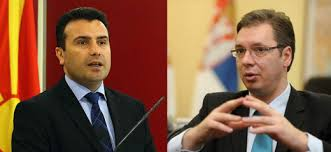
Regional leaders: Zaev and Vucic: who placed the right bet?
The message to the Serbian public is that nothing the EU is currently promising is likely to have any impact on their lives. There are no security guarantees. There is no European peace on the horizon. In the end only hard power matters. Serbia is getting ready for this new era by building up its military.
In the interest of Serbia, Kosovo, the Balkans and Europe this era should never arrive. The promise of Balkan peace through integration must not become a casualty of Serb nationalist illusions or EU complacency. It is up to European leaders to secure Balkan peace for the next decade. Germany and France would do well to start tomorrow in Berlin.
Best regards,

Gerald Knaus
Partition proposals and Kosovo Serbs
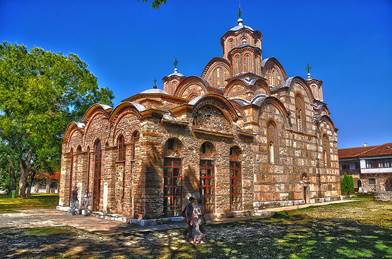
Gracanica monastery near Pristina
As Scott Adams writes in his book "Win Bigly", master persuaders move the energy of debates to the topics that help them. The persuasion trick is to focus all debate on the issue of one's choice: "The things you think about the most, and remember best, seem more important to you than other things … if you are using super strong persuasion, you can be wrong on the facts, and even the logic of your argument, and still win."
This is why Donald Trump talks about building a "big, beautiful wall" to capture public attention in ways no reference to "better border control" would ever manage. Unless Trump gets his wall, he implies, the US will be swamped by terrorists and drugs and his opponents will be to blame. At the same time, Adams notes, "there is one kind of wall that is hard to criticize; the one that is entirely different in each person's head."
Vucic's master stroke has been to shift the debate on normalization of relations with Kosovo as part of Serbia's EU accession process away from the commitments Serbia had taken on in 2013 and 2014 when it began accession talks. He also manages to avoid any discussion about what is actually be required to improve the lives of Kosovo Serbs living in Kosovo and of Albanians living in Serbia. "You must help us" (so if we fail, it is a result of insufficient support) is linked to "You must not interfere" (or if you do, we will fail for sure). "I do not say a single bad word about Albanians" coincides with Vucic's ministers accusing Kosovo's leader of planning a war crime to ethnically cleanse Kosovo of Serbs.
Vucic suggests that drawing a new, clean line on a map, a fair demarcation somewhere in Kosovo, will miraculously reduce tensions. He then warns that unless Serbia obtains this demarcation, there will be tensions, clashes, conflicts and perhaps even a new war, and this will all be the fault of those who do not have the courage to do the right thing. He also leaves completely vague what this new demarcation might look like: a Schengen border, an invisible line crossing the centre of Mitrovica? Or a place to position Serbia's new tanks, waiting for another provocation to move into the South of Kosovo?
Finally, Vucic's most striking magic trick has been to make the majority of Kosovo Serbs disappear as a serious issue in this debate on their future. On 14 August 2018 Vucic told a group of Serb soldiers:
"Who from you wants to go to Djakovica [a town in southern Kosovo]? Who from you wants to live in Djakovica? I don't want to live there, but is there anyone of you who does? There is no one. There is no one, but then they say that this is ancient Serb land that we will protect for 5,000 more years. But there is not a single Serb who wants to live there."
In fact, there are a lot of Serbs who still live in southern Kosovo: the majority of Kosovo Serbs lives there today. Thus, any ethnic demarcation, cutting of the North of Kosovo, would definitely not be in the interest of a majority of Kosovo Serbs; a community that did not flee Kosovo even in 1999, when the Serbian state pulled out. Nor would it be in the interest of North Mitrovica, their most important urban centre, and the most multiethnic urban place in Kosovo today. It is a proposal about territory, not about people and their interests; the kind of proposal the international community has rejected since 1999, and should continue to reject.
ESI has written about Mitrovica and Kosovo Serbs for more than 15 years. See here:
A post-industrial future? Economy and society in Mitrovica and Zvecan (2004)
People Or Territory? A Proposal For Mitrovica (2004)
The Lausanne Principle: Multiethnicity, Territory and the Future of Kosovo's Serbs (2004)
Mitrovica: Kosovo's Litmus Test. ESI Discussion Paper (2006)
First reactions to The Hypnotist
Balkan Insight: "EU Should Reject Serbia-Kosovo Border Changes: Report", 26 April 2019
Dnevni avaz: Intervju sedmice Gerald Knaus, prvi čovjek ESI-ja: Vučić je kao hipnotizer upao u um mnogih u EU i SAD i uvjerio ih da će izvesti Srbiju na pravi put, ali je vodi u drugom smjeru, 28 April 2019
Exit: EU Should "Immediately" Stop Talks on Territorial Swap Between Kosovo and Serbia, ESI Warn, 26 April 2019
In Memoriam Dejan Anastasijevic

A wonderful person, friend, colleague and inspiration for a whole generation has left us this week.
Professional, humble, witty and incredibly courageous: in the darkest times in the past decades for the region, Dejan represented the best side of Serbia in his dedication to truth and human dignity, even while exploring at personal risk horrendous crimes. He was a bright light in a region that had gone dark, not intimidated to investigate and report on the hardest issues.
When ESI made a documentary about Serbia in 2009 he was, naturally, a central character in the story of Serbia wrestling with its demons, trying to break free from its past. So here he is: his familiar, perceptive, casual self, thinking and explaining, courageous and humane, in the middle of his city in 2009:
Exit Serbia (from minute 13)
Dejan will leave a big gap. He will be sorely missed by his family and friends, and by honest people everywhere in the region, who looked to him for guidance, ideas and inspiration. But he will not be forgotten. RIP.
See also:
Dejan Anastasijevic: Who put bombs on my windowsill? (Vreme, October 2007)
The European Stability Initiative is being supported by Stiftung Mercator

